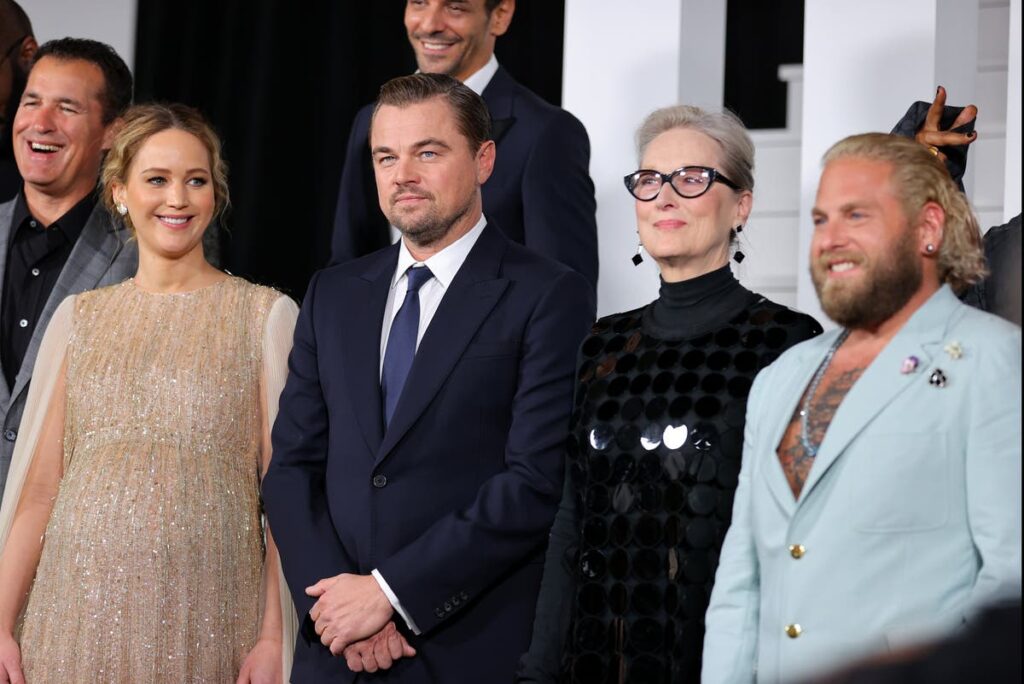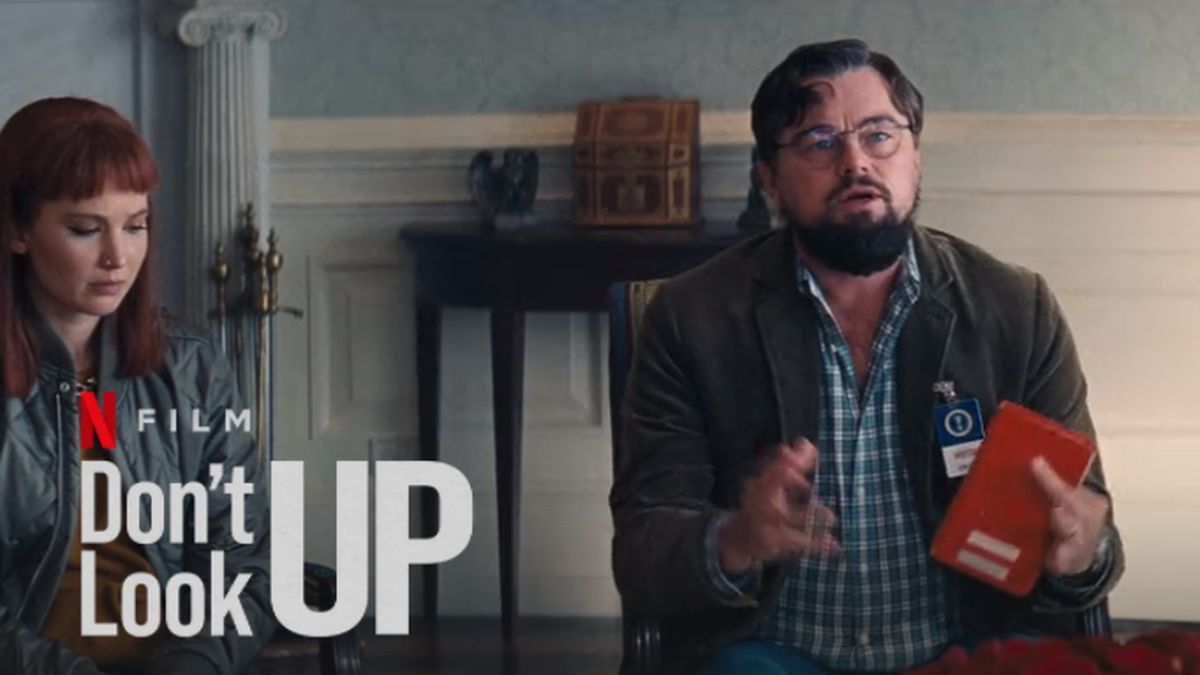By Maria Gkika,
In truth, we have not seen a purely satirical film at the cinemas for a long time and it was this approach of dark humor that made the movie great to watch. That is right; Don’t Look Up (2021) is not meant to make us laugh, but rather to stir up a conversation regarding a series of subjects. The use of irony and sarcasm, along with the help of aesthetically neat cinematography, assure that a hard-to-swallow message gets better received, though a sense of repetition can be tiring at times.
The film is about the upcoming destruction of our planet and how everyone deals with the news of the apocalypse. Two astronomers, Dr. Rndall Mindy (Leonardo DiCaprio) and Kate Dibiasky (Jennifer Lawrence) discover that a Mount Everest-sized comet is due to hit Earth in six months and wipe out all human life. Accompanied by Dr. Teddy Oglethorpe (Rob Morgan), they urgently present their findings to the White House but face the indifference of the government, the triviality of the media, and the ridicule of a misguided and distrusting society that will not believe what they are saying. Although they struggle to find a solution the best way they can, nothing seems to work against everyone’s willed blindness. Paralyzed by the elite, they watch as the situation gets out of control when social media gossip, opportunism, financial and political interests, ethical corruption, and conspiracy theories are added into the mix.

One element that made Don’t Look Up compelling is the disturbing issues it puts to frame, as it touches on so many different themes. How is our worldview shaped? Is there really no way to tell truth apart from lies in the modern world? Are we completely powerless to change things? The comet as a choice for biblical catastrophe gives the script all needed elements to explore even the most exaggerating reactions and artfully combines fantasy with realism. To what extremes do people go to avoid an uncomfortable truth? As this unknown enemy is invisible to the masses, some even defy the actual existence of the asteroid. Truth gets twisted and re-twisted every minute, as the audience gets the full sense of the confusion, distrust, and chaos. Each new interpretation on the matter leads to short-termed opinions and hasted actions based on assumptions and misinformation mostly provided by the government and the media. These various plot twists are well thought out, manage to surprise viewers, and keep them at the edge of their seats, We are constantly unsure of the outcome and eager to know how everything will turn out. Still, this delayed development can sometimes feel tiring and as if the story is boringly repeating itself.
It is also interesting to note that the characters do not develop significantly throughout the movie, as the main point of focus is the escalation of an illogical and dangerous situation into a real nightmare. Still, everyone’s acting is impeccable. Leonardo DiCaprio and Jennifer Lawrence are both convincing in their roles and demonstrate their anger, fear, and despair, without being melodramatic, while Jonah Hill retains a careful balance between comedy and satire while he plays Mama President’s annoyingly arrogant son. Meryl Streep has her villainous President played with a suggestive lightness and arrogance that was spot on for this genre. Mark Rylance is also captivating as the creepy lunatic Peter Isherwell, a mysterious and ambitious tech billionaire. Cate Blanchett and Tyler Perry accurately (re)present two obnoxious talk-show hosts that perpetuate the misuse of the media.

The second major characteristic of the film is its focus on being aesthetically pleasing and reaching the largest possible audience. As the theme is bleak and leads the viewer to face difficult questions, the creators opted for a more commercial and upbeat tone, as well as bright colors that would still entertain the audience, but also allow for a serious point to get across. The score by Nicholas Britell pointedly illustrates the absurd tone of the film and perfectly complements the viewer’s emotions, while the fast-paced editing brings to life the wild surrealistic situation from various viewpoints. What is more, all roles are played by well-known actors that add to the film’s goal for commercial beauty. Further supporting this approach is the fact that many members of the cast are often associated with lighter comedy films. However, all aspects of the movie enhance its devastating irony and the humorous elements are cleverly used in place of dramatic scenes that could make it hard to watch. These choices are auto sarcastic. It is telling that at one point the film is even cauterizing its own perceived nature: “It is for everyone you know? It is a popcorn movie”.
All in all, Don’t Look Up is one of those films that stand out. It certainly has something to give, something that is, first of all, comprehensive and aesthetic. As I see it, director Adam McKay manages to engage the audience in a bigger conversation, making an otherwise extreme situation eerily relatable, especially at this post-pandemic time. I think all of us can see ourselves somewhere in the movie, and many character lines will bring a melancholic smirk to our lips.
References
- Look away: why star-studded comet satire Don’t Look Up is a disaster, theguardian.com, Available here
- ‘Don’t Look Up’…or You Might See One Bomb of a Movie Hurtling Right Toward You, rollingstone.com, Available here
- Don’t Look Up (2021), imbd.com, Available here
- Why Are People So Mad About Don’t Look Up?, theatlantic.com, Available here
- Film Review: ‘Don’t Look Up’ is a star-studded disaster, thepostathens.com, Available here




